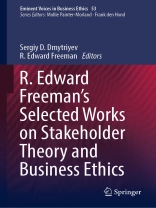Ed Freeman’s influential ideas on stakeholder theory, business ethics, humanities, and capitalism became foundational in the management field and turned around the mainstream thinking about business. Stakeholder theory developed by Freeman and others posits that business is not as much about profits, but rather about creating value for its stakeholders, including employees, customers, communities, financiers, and suppliers. The relationship between a company and its stakeholders is the essence of business and should be of utmost attention to its managers. Managers should avoid resorting to trade-offs by prioritizing one stakeholder group (e.g., shareholders) over the others and strive to run their companies in the interests of all stakeholders. The idea of pursuing the interests of all stakeholders became revolutionary in management and went far beyond the management field, expanding to Law, Health Care, Education, Public Policy and Administration, and Environmental Policy. This book is a collection of Ed Freeman’s most influential and important works on stakeholder theory as well as business ethics, humanities, and capitalism.
Spis treści
1. An Essay to R. Edward Freeman’s Selected Works; Sergiy Dmytriyev and R. Edward Freeman.- PART I. STAKEHOLDER THEORY.- 2. Introduction to R. Edward Freeman’s Works on Stakeholder Theory; Sergiy Dmytriyev and R. Edward Freeman.- 3. The Problems that Stakeholder Theory Tries to Solve; written with J. Harrison, A. Wicks, B. Parmar, and S. de Colle.- 4. Stakeholder Management: Framework and Philosophy; R. Edward Freeman.- 5. Stakeholder Management: A Case Study of the U.S. Brewers and the Container Issue; With James Emshoff.- 6. Theory Building in Strategic Management; With Peter Lorange.- 7. Corporate Governance: A Stakeholder Interpretation; With William Evan.- 8. A Feminist Reinterpretation of the Stakeholder Concept; With Andrew Wicks and Daniel Gilbert.- 9. The Politics of Stakeholder Theory: Some Future Directions; R. Edward Freeman.- 10. Stakeholder Capitalism and the Value Chain; With Jeanne Liedtka.- 11. Toward a Life Centered Ethic for Business; With Joel Reichart.- 12. Stakeholder Theory: A Libertarian Defense; With R. Phillips. -13. Business Ethics and Health Care: A Stakeholder Perspective; With M. Gilmartin.- 14. Stakeholder Theory: A Names and Faces Approach; With J. Mc Vea.- 15. Enhancing Stakeholder Practice: A Particularized Exploration of Community; With L. Dunham and J. Liedtka.- 16. A New Approach to CSR: Company Stakeholder Responsibility; With R. Velamuri, in A. Kakabadse and M. Morsing.- 17. Corporate Citizenship and Community Stakeholders; With R. Phillips.- 18. Managing for Stakeholders; R. Edward Freeman. -19. Managing for Stakeholders: Tradeoffs or Value Creation; R. Edward Freeman.- 20. Five Challenges to Stakeholder Theory: A Report on Research in Progress; R. Edward Freeman.- 21. The Social Responsibility of Business is to Create Value for Stakeholders; With H. Elms. Sloan.- PART II. BUSINESS ETHICS.- 22. Introduction to R. Edward Freeman’s Works on Business Ethics; Sergiy Dmytriyev and R. Edward Freeman.- 23. The Revolution in Management; written with Daniel Gilbert, Englewood Cliffs.- 24. The Business Sucks Story; R. Edward Freeman.- 25. Corporate Social Responsibility: A Critical Approach; with Jeanne Liedtka.- 26. Business, Ethics and Society: A Critical Agenda; with Daniel Gilbert.- 27. A Puzzle About Business Ethics; with Gordon G. Sollars.- 28. Business Ethics at the Millennium; R. Edward Freeman .- 29. The Impossibility of the Separation Thesis; with J. Harris.- 30. Teaching Business Ethics in the Age of Madoff; with Lisa Stewart and Brian Moriarty.- 31. Creating Ties That Bind; with Jared Harris.- 32. Remoralizing the Debate; R. Edward Freeman.- 33. Values, Authenticity and Responsible Leadership; with Ellen A. Auster.- 34. Bowie’s Ethics: A Pragmatist Perspective; R. Edward Freeman.- 35. Values and Poetic Organizations: Beyond Value Fit Toward Values Through Conversation; with Ellen R. Auster.- 36. Business should be driven by Purpose; R. Edward Freeman.- 37. Business isabout innovation. So why do we teach it the same old way?; R. Edward Freeman.- 38. Ethics and the Algorithm; With B. L. Parmar.- 39. A Pragmatist Approach to Business Ethics Research with Parmar, B. L., Phillips R.- 40. Responsible Disruption: Which Rules Are Worth Breaking?; With B. L. Parmar.- 41. Profit and Other Values: Thick Evaluation as Basis for Decision Making; with B. van der Linden.- PART III. BUSINESS ETHICS AND HUMANITIES .- 42. Introduction to R. Edward Freeman’s Works on Business Ethics and Humanities; Sergiy Dmytriyev and R. Edward Freeman.- 43. Orwell and Organizations; with Daniel R. Gilbert, Jr.- 44. The Ethics of Greenmail; with Daniel R. Gilbert, Jr. and Carol Jacobson.- 45. Airline Horror Stories Indicate an Ethical Problem; R. Edward Freeman.- 46. Healthy Tension between Business and News Media; R. Edward Freeman.- 47. Values and the Foundations of Strategic Management; with Daniel Gilbert and Edwin Hartman.- 48. Let’s Disband the Academy of Management; R.Edward Freeman.- 49. Business Ethics: A Literary View; R. Edward Freeman.- 50. Business as a Humanity: Toward Reinventing the Business School R. Edward Freeman.- 51. Business as a Humanity – Postscript; R. Edward Freeman.- 52. The Relevance of Richard Rorty to Management Research: A Book Review Essay; R. Edward Freeman.- 53. Business As a Human Activity; with D. Newkirk.- 54. Business School Research; with David Newkirk.- 55. Leveraging the Creative Arts in Business Ethics Teaching; with L. Dunham, G. Fairchild, and B. Parmar.- 56. Practicing Human Dignity: Ethical Lessons from Commedia dell’Arte and Theater; With Simone de Colle, Bidhan Parmar, and Leonardo de Colle.- PART IV. STAKEHOLDER THEORY AND CAPITALISM.- 57. Introduction to R. Edward Freeman’s Works on Stakeholder Theory and Capitalism; Sergiy Dmytriyev and R. Edward Freeman.- 58. The Myth of Cowboy Capitalism; R. Edward Freeman.- 59. Understanding Stakeholder Capitalism; R. Edward Freeman.- 60. Create a New Story About Business; R. Edward Freeman.- 61. Poor People and the Politics of Capitalism; With Adrian Keevil and Lauren Purnell.- 62. Capitalism has a bright future full of innovation and hope; R. Edward Freeman.- 63. Short term vs. long term…. a skeptical view and an alternative; R. Edward Freeman.- 64. Responsible Capitalism: Business for the 21st Century; With B. Parmar, and K. Martin.- 65. The New Story of Business: Towards a More Responsible Capitalism; R. Edward Freeman.
O autorze
Sergiy D. Dmytriyev is Assistant Professor of Management at James Madison University (JMU). He received his Ph D in Business Administration from the University of Virginia, MA in Economics from Michigan State University, and an MBA from IESE Business School. His research interests connect Strategic Management and Social Issues through the exploration of stakeholder management and supererogation (going beyond duty) in organizations. He previously co-edited such books as Cambridge Handbook of Research Approaches to Business Ethics and Corporate Responsibility (Cambridge University Press, 2017), The Moral Imagination of Patricia Werhane: A Festschrift (Springer, 2018), and Humanizing Business: What Humanities Can Say to Business (Springer, 2022). He has also co-authored articles on different aspects of stakeholder theory published in Journal of Management, Journal of Management Studies, and Symphonia. Emerging Issues in Management. Prior to joining academia, Dmytriyev worked for Procter & Gamble, Bain & Company, and Monsanto. He resides with his wife and three children in Harrisonburg, Virginia.
R. Edward Freeman is University Professor, Elis and Signe Olsson Professor of Business Administration, Academic Director of the Institute for Business in Society, and Senior Fellow of the Olsson Center for Applied Ethics at the University of Virginia Darden School of Business. He is best known for his award-winning book, Strategic Management: A Stakeholder Approach (Pitman, 1984; and reprinted by Cambridge University Press in 2010). His latest books are The Power of And with Kirsten Martin and Bidhan Parmar (Columbia University Press, 2020), The Cambridge Handbook of Stakeholder Theory with Jeffrey Harrison, Jay Barney and Robert Phillips (Cambridge University Press, 2019), Cambridge Handbook of Research Approaches to Business Ethics and Corporate Responsibility with Patricia Werhane and Sergiy Dmytriyev (Cambridge University Press, 2017), and Bridging the Values Gap with Ellen Auster (Berrett-Koehler Publishers, 2015). He has received six honorary doctorates (Doctor Honoris Causa) from: Radboud University in the Netherlands, Universidad Pontificia Comillas in Spain, the Hanken School of Economics and Tampere university in Finland, Sherbrooke University in Canada, and Leuphana University in Germany for his work on stakeholder theory and business ethics. Freeman has been Co-Editor-in-Chief of the Journal of Business Ethics, one of the leading journals in business ethics. He is the author of more than 300 publications in a wide variety of academic and practitioner outlets. At its 2010 annual meeting, the Society for Business Ethics presented Freeman with its “Outstanding Contributions to Scholarship Award” for his stakeholder theory work, to which there has currently been more than 100, 000 citations. The Academy of Management awarded Freeman the 2018 Award for Distinguished Scholarly Contributions to Management recognizing his influential lifetime career achievements. He is a lifelong student of philosophy, martial arts, and the blues. Freeman is a co-founding member of Red Goat Records, LLC (redgoatrecords.com) bringing joy of original soul and rhythm and blues music into the twenty-first century. He is also a principal in Stakeholder Media LLC sponsor of The Stakeholder Podcast where he is the host.












